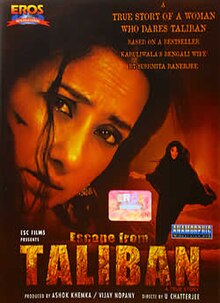| Escape from Taliban | |
|---|---|
 DVD cover | |
| Directed by | Ujjwal Chatterjee |
| Written by | Sushmita Banerjee (book A Kabuliwala's Bengali Wife) Ujjwal Chatterjee (screenplay) Shubhrajyoti (dialogue) |
| Produced by | Ashok Khemka Vijay Nopany |
| Starring | Manisha Koirala Nawab Shah |
| Cinematography | Vivek Banerjee |
| Edited by | Ujjal Nandi |
| Music by | Songs: Babul Bose Score: Vanraj Bhatia |
Release date |
|
Running time | 166 minutes |
| Country | India |
| Languages | Hindi Urdu English |
| Budget | ₹ 3.50 crore [1] |
| Box office | ₹ 1.44 crore [1] |
Escape from Taliban is a 2003 Indian film directed by Ujjwal Chatterjee. The film is based on the story A Kabuliwala's Bengali Wife by Sushmita Banerjee, who fled Afghanistan in 1995 after six years of living there with her Afghan husband. [2]
Contents
Sushmita Banerjee, whose book inspired this movie, was shot dead by suspected Taliban militants in Afghanistan in September 2013. [3]